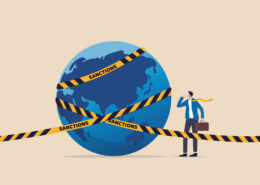Biden Signs Executive Order Targeting Foreign Banks Supporting Russia
A Call to Action for Foreign Financial Institutions to Improve their Due Diligence Processes
📅 December 29, 2023
📅 December 29, 2023
US President Joe Biden on December 22, 2023, signed an executive order (EO) amending EO 14024—Blocking Property With Respect To Specified Harmful Foreign Activities of the Government of the Russian Federation—to authorize the US Treasury Department’s Office of Foreign Assets Control (OFAC) to designate foreign financial institutions that help Russia’s defense industry, as Moscow’s war against Ukraine approaches its two-year anniversary. The President signed the new EO several days after the EU adopted its 12th package of sanctions against Russia, which included a ban on Russian diamonds and designated additional Russian individuals and entities, freezing their assets and imposing travel bans.
As Russia works to rebuild its military after nearly two years of fighting, the Biden administration will likely utilize the new authority to designate or threaten to designate, foreign financial institutions in countries such as China, Türkiye, and the UAE that help Russia evade sanctions and enhance its military capabilities.
According to the White House Fact Sheet, the EO amends EO 14024 to expand US authorities to sanction:
Foreign financial institutions that are designated by OFAC for engaging in these activities will either face full blocking sanctions or significant limits on their US correspondent accounts.
OFAC, in coordination with the release of the new EO, has issued guidance advising foreign financial institutions on strategies to mitigate their risk of being sanctioned by the United States and listing activities that could expose them to sanctions risk, such as:
By listing activities that could expose foreign financial institutions to US sanctions, OFAC is targeting many sanctions evasion methodologies that Russia uses to gain access to restricted goods and technologies, as well as the global financial system.
OFAC’s guidance highlights the convergence between sanctions evasion and money laundering and advises that financial institutions should conduct baseline customer due diligence (CDD) and use other anti-money laundering controls commensurate with its current exposure to Russia’s military-industrial sector and its supporters to ensure they are not violating US sanctions.
US regulators are more thoroughly enforcing trade controls meant to limit Russia’s access to critical weapons and technologies. The United States is working with foreign allies and taking a whole-of-government approach to hold those who evade sanctions and trade controls accountable for violations, working to ensure that US-origin military equipment and technologies do not fall into Russia’s hands.
The Treasury Department, in concert with the new EO, also issued a list of critical items, advising foreign financial institutions to avoid facilitating the sale or transfer of these articles to Russia to reduce sanctions risk under the new authorities. The list includes 29 items including certain machine tools and manufacturing equipment, manufacturing materials for semiconductors and related electronics, electronic test equipment, certain propellants, chemical precursors for propellants and explosives, certain lubricants and additives, certain ball and roller bearings, certain advanced optical systems, and certain navigation instruments.
In addition to amending EO 14024 to target foreign financial institutions that help Russia’s war in Ukraine, the new EO also amends EO 14068 to make importing specific Russian goods to the United States, such as diamonds and seafood, more difficult. Certain products mined, extracted, produced, or manufactured wholly or in part in Russia are banned, even if these products are then transformed or processed in a third country, as is the importation of certain products harvested in Russian waters or by Russia-flagged vessels.
The United States and its partners in the coming months also intend to introduce import restrictions on diamonds mined, processed, or produced in Russia, building on an existing US ban on the importation of Russian-origin diamonds, according to the White House Fact Sheet issued along with the new EO. India processes most rough diamonds, and Russia is the biggest rough diamond producer in the world. The Group of Seven (G7) nations and the EU said they would ban non-industrial diamonds from Russia starting in January 2024, followed by a block in March on Russian-origin diamonds processed in third countries. A traceability mechanism is expected to be implemented in September, which will help identify rough diamonds of Russian origin. More than 90 percent of Russia’s diamonds come from US-designated, state-owned mining enterprise, Alrosa, according to OFAC.
The latest Executive Order signals an increased enforcement stance on the part of US regulators. Senior US officials recently traveled to Turkey and the UAE to express their concerns about financial institutions that transact with entities subject to US sanctions.
Russia’s intelligence services use both witting and unwitting financial intermediaries to facilitate sanctions evasion and access restricted materials. Front companies and networks in third countries also facilitate Russia’s access to restricted materials. Therefore, financial institutions must exercise extra caution when transacting with entities in high-risk jurisdictions—especially countries known as offshore secrecy havens, “neutral” jurisdictions that have not imposed sanctions on Russia, or countries known for free-trade zones—or in sectors vulnerable to exploitation by Russian actors, such as technology, defense, and aviation. Simple list screening will be insufficient to prevent sanctions evasion, and financial institutions will probably engage in increased de-risking to avoid becoming vulnerable to secondary sanctions and being cut off from the US financial system.
The DOLFIN platform lists evasion tactics, such as obfuscation of addresses and use of anonymous legal entities, as well as techniques involving senior government officials, such as the use of subsidiaries of state-owned banks.
DOLFIN also describes strategies and techniques to identify and mitigate sanctions risks, highlighting the challenges of detecting Russian sanctions evasion because of Russia’s interconnectedness with the global financial system and the sophistication of Russian actors when concealing beneficial ownership information and source of funds through front and shell companies.
DOLFIN’s resources on export controls can help financial institutions implement standards associated with the risks of financial crimes associated with trade. Coupled with OFAC’s latest recommendations, the resources listed on the DOLFIN platform can help mitigate the risk of sanctions and other penalties, as regulators continue to crack down on violators.
Significant transactions. OFAC may consider the totality of the facts and circumstances when determining whether transactions are “significant.” These factors can include:
OFAC almost certainly will not impose secondary sanctions on financial institutions that unwittingly engage in a limited number of transactions. However, knowingly and intentionally helping sanctioned individuals and entities evade restrictions by facilitating illegal transactions or creating payment mechanisms to help sanctioned entities obscure the end-users or true purpose of transactions can result in full blocking sanctions or restrictions on their US correspondent accounts.
The new EO is a warning not just to foreign financial institutions that they will be subject to secondary sanctions if they are found to be facilitating Russia’s access to restricted goods and technologies or helping the Russian military’s aggression in Ukraine. Manufacturers and exporters should also be cautious when dealing in products that bear a high risk of evasion or diversion and should enhance their due diligence processes. Vulnerable sectors such as aviation, energy, defense, and technology should warrant closer examination.
The new EO indicates the Biden Administration’s increased determination to prevent Russia from accessing critical equipment and technologies that will enable Moscow to continue its war in Ukraine. OFAC is probably under pressure to designate in the near term one or more foreign financial institutions involved in facilitating Russian sanctions evasion to demonstrate its resolve to disrupt Russia’s military aggression. Treasury Secretary Janet Yellen after the release of the new EO stated that Treasury expects financial institutions to undertake every effort to ensure that they are not witting or unwitting facilitators of circumvention and evasion.
“And we will not hesitate to use the new tools provided by this authority to take decisive, and surgical, action against financial institutions that facilitate the supply of Russia’s war machine.” December 22, 2023










 A Timeline of US, EU, and UK Sanctions on Russia in 2023
A Timeline of US, EU, and UK Sanctions on Russia in 2023This site uses cookies. By continuing to browse the site, you are agreeing to our use of cookies.
Accept settingsHide notification onlySettingsWe may request cookies to be set on your device. We use cookies to let us know when you visit our websites, how you interact with us, to enrich your user experience, and to customize your relationship with our website.
Click on the different category headings to find out more. You can also change some of your preferences. Note that blocking some types of cookies may impact your experience on our websites and the services we are able to offer.
These cookies are strictly necessary to provide you with services available through our website and to use some of its features.
Because these cookies are strictly necessary to deliver the website, refusing them will have impact how our site functions. You always can block or delete cookies by changing your browser settings and force blocking all cookies on this website. But this will always prompt you to accept/refuse cookies when revisiting our site.
We fully respect if you want to refuse cookies but to avoid asking you again and again kindly allow us to store a cookie for that. You are free to opt out any time or opt in for other cookies to get a better experience. If you refuse cookies we will remove all set cookies in our domain.
We provide you with a list of stored cookies on your computer in our domain so you can check what we stored. Due to security reasons we are not able to show or modify cookies from other domains. You can check these in your browser security settings.
These cookies collect information that is used either in aggregate form to help us understand how our website is being used or how effective our marketing campaigns are, or to help us customize our website and application for you in order to enhance your experience.
If you do not want that we track your visit to our site you can disable tracking in your browser here:
We also use different external services like Google Webfonts, Google Maps, and external Video providers. Since these providers may collect personal data like your IP address we allow you to block them here. Please be aware that this might heavily reduce the functionality and appearance of our site. Changes will take effect once you reload the page.
Google Webfont Settings:
Google Map Settings:
Google reCaptcha Settings:
Vimeo and Youtube video embeds:
You can read about our cookies and privacy settings in detail on our Privacy Policy Page.
Privacy Policy